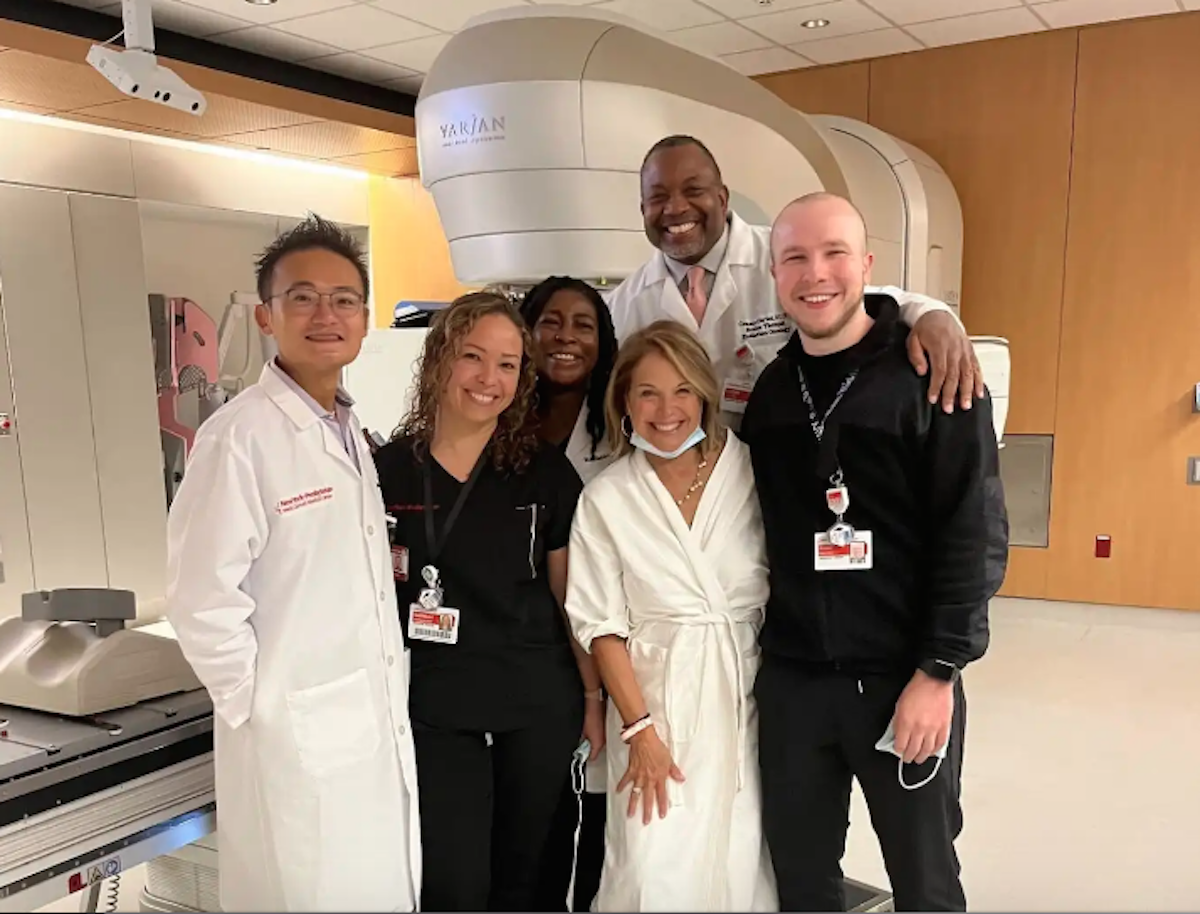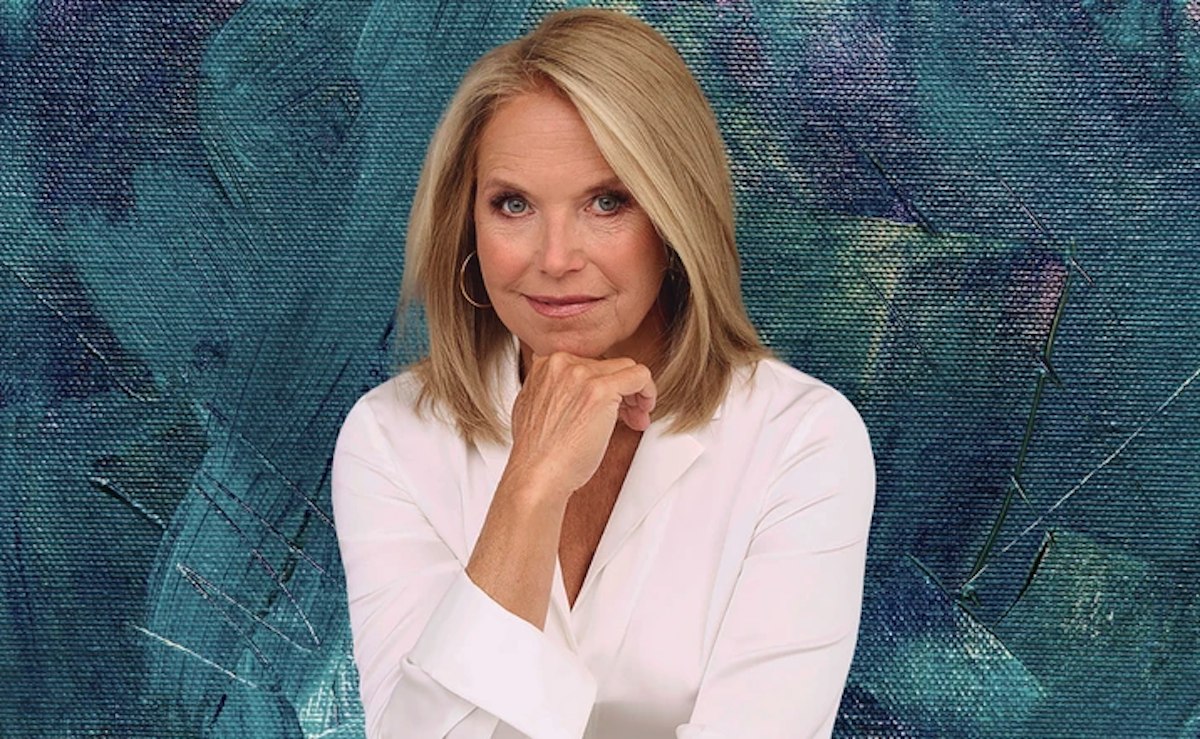All About Dense Breasts
- Most women with dense breasts, like Katie Couric, are unaware that dense breasts could increase their risk of developing breast cancer, according to a new peer-reviewed study titled Perceptions of Breast Cancer Risks Among Women Receiving Mammography Screening.
- Katie Couric, 66, now cancer-free, also has dense breasts and stresses the importance of getting routine screenings because “the denser your breasts, the higher your risk of cancer.”
- For anyone unsure of the meaning of dense breasts, Cancer.org explains them as breasts with "relatively high amounts of glandular tissue and fibrous connective tissue and relatively low amounts of fatty breast tissue."
- Women of all shapes and sizes can have dense breasts it's very common. What's important to know is that dense breasts make it more difficult to detect cancer on a regular mammogram. Because of this, some doctors suggest seeking out a facility that offers 3D mammograms. That's definitely something worth discussing with your doctor.
The peer-reviewed study, titled Perceptions of Breast Cancer Risks Among Women Receiving Mammograph Screening, was published in the Journal of the American Medical Association on January 23, 2022.
Read More
“In this qualitative study of women aged 40 to 76 years, family history was perceived as the greatest risk factor for breast cancer,” the study explained in its findings. “In interviews, few women perceived breast density as a risk factor, and one-third thought that they could not take any actions to reduce their breast cancer risk.”
The study found that 93% of respondents felt breast density was a lesser risk than having a first-degree relative with breast cancer or being overweight or obese (65%).
According to the Susan G. Komen organization, approximately 40 to 50 percent of women between the ages of 40 and 74 in the U.S. have high breast density.
“About 50-60 percent of women ages 40-44 have dense breasts, compared to 20-30 percent of women ages 70-74,” the organization explains. “About 50-60 percent of women with a healthy weight have dense breasts, compared to 20-30 percent of obese women.”
Katie Couric's Breast Cancer Journey
Katie Couric made her breast cancer announcement on Sept. 28, 2022, in an essay for Katie Couric Media.
"June 21, 2022, was the first day of summer, my 8th wedding anniversary, and the day I found out I had breast cancer," the essay title reads.
Prior to her diagnosis, Couric revealed she was overdue for a mammogram.
"'You're due for a mammogram,' my gynecologist said, looking over my medical chart. It was May; I had just gotten a pap smear and was still sitting on the exam table in my pink cotton (open in the front) gown," Couric wrote. "'That's crazy, I just got one!' I told her, with a hint of indignation."
But much to her dismay, Couric actually hadn't had a mammogram since December 2020.
"I'm normally vigilant, bordering on neurotic, about taking care of my health, especially after my husband Jay died of colon cancer in 1998," she wrote. "Had the pandemic given me a skewed sense of time? Had it messed with my memory?"
Following a 3D mammogram, a breast ultrasound and a biopsy, Couric was diagnosed with hormone receptor-positive, Her2neu-negative breast cancer. She's since undergone a lumpectomy and radiation treatment, but she'll need to take an aromatase inhibitor for five years.

During her cancer announcement, Couric also revealed that her breasts are dense and she “routinely gets an additional screening using a breast ultrasound.”
“Forty-five percent of women in this country (yes, nearly half) have dense breasts, which can make it difficult for mammograms alone to detect abnormalities,” Couric wrote.
“Currently, 38 states require doctors to notify their patients if they have dense breasts,” she added. “But often that information doesn't clearly convey the need to have a supplemental screening or this very important fact: The denser your breasts, the higher your risk of cancer.”
Dense Breasts & 3D Mammograms
It's no secret that no two breasts are alike, not even on the same body! Some are bigger, some are smaller, some vary in shape, and some have different-sized nipples and shades of areolas. But breasts could be more "dense" than others, too.
So you have dense breasts. Who knew? Probably not you, because there's no way to tell just by feeling them. Women of all shapes and sizes can have dense breasts it's very common. What's important to know is that dense breasts make it more difficult to detect cancer on a regular mammogram. Because of this, some doctors suggest seeking out a facility that offers 3D mammograms. That's definitely something worth discussing with your doctor.
If you suspect you have dense breasts, ask your doctor if it's possible in your next mammogram. Typically, they'll tell you anyway, and suggest the need for a 3D mammogram so early signs of anything potentially harmful can be detected.
But bear in mind that the U.S. Preventive Services Task Force a panel funded by the government whose recommendations are followed by many doctors doesn't recognize the need for 3D mammograms. Consequently, some insurance companies may not pay for it unless you get a letter from your doctor stating that it is medically necessary.
I Have Dense Breasts. Do I Need a 3D Mammogram?
When You're Getting a Mammogram, Ask About Dense Breasts
As previously discussed, dense breasts can sometimes make cancer more difficult to detect. Unfortunately, there's no way to determine if you have dense breasts just by feeling them only a mammogram can determine if you have it. Bestselling author and breast cancer survivor Laura Morton learned a really important lesson about advocating for herself when she was getting a mammogram and questioned her radiologist about dense breasts. The radiologist brushed her off.
Survivors Encourage Women to Ask Their Doctors About Dense Breasts
"I waited until afterward to mention to her how I felt about her response to what is a really important question, you can not feel if you have dense breasts. You have to be told if you have dense breasts," Laura says. "…So when somebody walks through your door and says, 'Do I have dense breasts?' Answer their question, don't roll your eyes and make them feel small for asking something that we are entitled to know."
Asking doctors questions like, "Do I have dense breasts?" or "Do I need to consider getting a 3D mammogram?" really can save lives. So ask, ask, ask!
Understanding Your Breast Cancer Risk
The risk of developing breast cancer varies greatly from person to person, so it's important to discuss your specific risk level with your doctor. That being said, there are some important risk factors to keep in mind.
Major Reduction in Cancer Risk by Following Old Standbys Diet and Exercise
In a previous interview with SurvivorNet, Dr. Elizabeth Comen, a medical oncologist at Memorial Sloan Kettering Cancer Center, laid out several risk factors for breast cancer including:
- Being a woman: Women are at a higher risk for breast cancer, though men can get the disease too.
- Age: "Breast cancer becomes increasingly more common as women age," Dr. Comen said.
- Family history: "Some people think that breast cancer is only inherited through genes on the mom's side,' Comen said. "But it can also be related to genetic mutations that could be found on the father's side."
- Having had a prior biopsy on an abnormal area: "There are different markers, that if a woman has had a biopsy, it's important that she talk to her doctor about whether those markers are lending themselves to an increased risk of breast cancer," Dr. Comen said. If you've had a biopsy that indicated atypical hyperplasia, for example, you are at an increased risk of breast cancer. Atypical hyperplasia isn't cancer, but it is a precancerous condition that describes an accumulation of abnormal cells in the milk ducts and lobules of the breast.
- Radiation exposure: Cancer survivors who've had radiation to their chest are at an increased risk of breast cancer.
- Lifetime estrogen exposure: "About 2/3 of breast cancer are driven by the hormone estrogen," Dr. Comen said. "So, that means if a woman has had her period at an early age and started to go through puberty at an early age, at seven, eight, nine, and potentially a later age of menopause, means that her lifetime of having had menstrual periods and being exposed to higher levels of estrogen is higher, and therefore her risk of breast cancer is slightly higher."
- Not having a child before age 30 or never having children
- Obesity
- Drinking alcohol
- Lack of exercise: "While there's more research to be done in this area, it looks like if a woman is not exercising, she may also increase her risk for breast cancer," Dr. Comen said.
Know the Signs of Breast Cancer
It's always important to stay on top of any changes to your health and address them promptly. Signs and symptoms of breast cancer can include the following:
- A breast lump or thickening that feels different from the surrounding tissue
- Change in the size, shape or appearance of a breast
- Changes to the skin over the breast, such as dimpling
- A newly inverted nipple
- Peeling, scaling, crusting or flaking of the pigmented area of skin surrounding the nipple (areola) or breast skin
- Redness or pitting of the skin over your breast, like the skin of an orange
It's important to keep an eye out for these symptoms while remembering that having one or many of them does not necessarily mean you have breast cancer. Regardless, you should always speak with a doctor right away if anything ever feels off or you're experiencing one or more of the signs listed above. You never know when speaking up about your health can lead to a very important diagnosis.
Contributing: SurvivorNet Staff
Learn more about SurvivorNet's rigorous medical review process.
